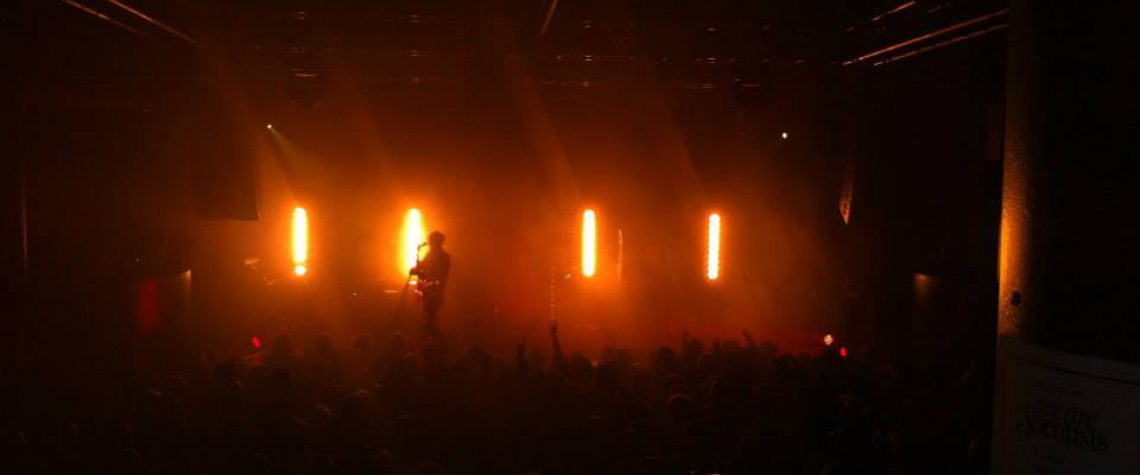Originally released 13th September 1999. Review originally published November 9th 2008.
It’s 1999 and the guitar is fucked. Just to be clear, I don’t mean music with guitars in it – there were still a few bands stumbling around in the long, dark night of the soul between Britpop and nu-metal – but the essence of the guitar as we’d known it for almost five decades was bleeding out slowly onto the floor of our consciousness.
The guitar after all was something more than a musical instrument. It’s design and metaphysical construct were pure pagan idolatry – it was a five string, twenty fret cock, to be worshipped as both storyteller and fertility symbol. Without the guitar three generations would’ve had no reason to gather, couple and procreate. You could be left under no illusion; the guitar was the latter twentieth century’s maypole.
What replaced it was in many ways counterfeit, the cult of the DJ, the new god, artisan spinners of other people’s music, transported around the country’s motorway networks in the small hours of weekend mornings, more and more resembling Von Daniken’s alien gods appearing in front of a crowd of confused acolytes seeking further enlightenment.
Worse than that, this was the era of corporate clubbing, good times as a brand, the experience akin to prostitution in reverse, where everyone on that side of the white rope fucked you, but you ended up paying them for it. Couple that with the fact that the millennium was about to end in apocalyptic fury or – if you were an atheist – a black screen with a cursor blinking in the bottom left hand corner of your monitor and it was less than surprising that most people were like the dead walking, under the influence of duality, lacking focus and susceptible to just about any suggestion our twenty four hour news channels could proton ray into their heads. Fuck, it was a mess.
There are guitars on The Contino Sessions of course, some of which are real, some of which are pretending to be them. And DIV were ironically those very pariahs I’ve just talked about – Disc Jockeys, to name them precisely. One half of the duo was Richard Fearless, a former doyen of the same Heavenly Social sessions alongside The Chemical Brothers. Perhaps it’s better to keep your enemies closer. The other half was now however Tim Holmes, who had replaced Steve Hellier in between the Contino Sessions and the release of first album Dead Elvis. The messy diatribe that was their debut was little more however than a pupation, a ragged eared pup. When the process was complete, something quite different existed, a thing ensconced in a twisted parallel universe, hugging Crowley and Levay, Bundy and Manson, paying restitution only to The Stooges playing Burroughs covers at a thirty-two and a third.
Authentically, The Contino Sessions revels in the kind of pronounced schizophrenia which haunts the shattered inhabitants who slide around it’s darkened alleys. Quite simply, when one of the multiple collaborators is in town, the results are almost always edgy, darker than black and deliberately, brilliantly unsettling. Without them, things tends to wander in an aimless hippy daze, like a white magic queen.
Dealing briefly with the lesser half first, there is too much tendency to stay in the haze. Flying sounds like a drunken church organist piping along at random with a lap full of vomit, Aladdin’s Story features The London Community Gospel choir but still feels like it’s been assembled from a random string of melody lines. Continuing the formula, Neptune City’s washed out psychedelia and Lever Street’s eddying Whiter Shade of Pale motif do little to convince that without the creative pressure of making music for someone else to contribute to Fearless and Holmes are at a loose end.
The evil twin, like all good Doppelgangers, is the fascinating, addictive and provocative one. Appearing first, it’s snout was Dirge, a creeping lesson in paranoia, Dot Allison managing in three notes to convey the detachment of Cruella De Ville and Eva Peron, whilst every eight bars Tim Holmes pummeling bass is joined by multi layered walls of distortion and feedback.
Now, if you’re trying to restitution for ending the epoch of the guitar, then who better to genuflect towards for mercy than Iggy Pop, his plaything here being Aisha, the grandaddy of punk revisiting Raw Power backed by the Manson Family. Fewer lines that decade reverberated more than Iggy’s charachter intoning thickly “I’m a murderer” to his new squeeze, whilst chords rake back and forth like searchlights hitting barbed wire; Charlie it seems don’t DJ.
Bobby Gillespie was already by this point a veteran of a thousand thousand yard sunrise stares, but his sneering dementia on Soul Auctioneer more or less stole the show. With lyrics drawn from a discarded chapter from the Naked Lunch, it’s mixture of throbbing Krautrock and avant garde screeches make it as uncomfortable as it gets without completely forsaking music as an art form. The last in the unholy triptych was Jim Reid, who stumbles through Broken Little Sister sounding like he’s just arrived from a distant planet. It’s the least affecting contribution of the three, but still leaves the impression of being an echo from the other side.
The Contino Sessions earned Fearless and Holmes earned them a 2000 Mercury Pize Nomination and is widely credited with being the muse for The Soulsavers’ 2006 essay It’s Not How Far You Fall, It’s The Way You Land. Like the time of it’s release, ultimately it didn’t mean anything, didn’t change anything and didn’t stand for anything. Working with it had all the vestiges of a séance; depending on who you were speaking to, the ride could be slick and thrilling or fuzzy and confusing. Back in this world, simply put this is one half of one of the best albums of the decade.


1 Comment
Comments are closed.